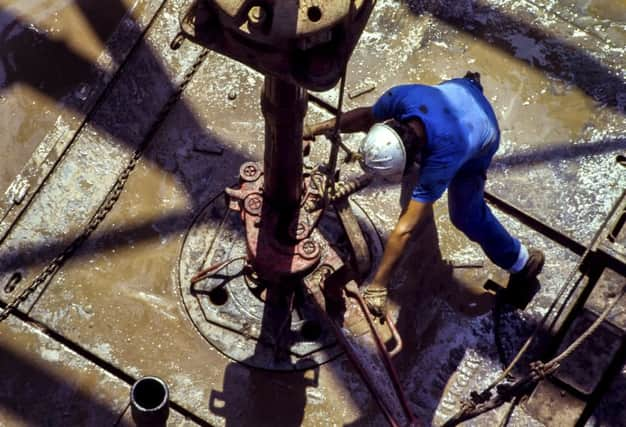Oil sector turbulence triggers slowdown in Scottish economy


The State of the Economy report published by chief economist Gary Gillespie predicts growth of between 0.9 per cent and 1.3 per cent for 2017 and 2018.
The report warned that such growth levels meant it was “not unexpected” to have a negative quarter at some stage over the period, but added that underlying strengths meant growth should “remain resilient”.
Advertisement
Hide AdAdvertisement
Hide AdDr Gillespie’s report said: “Brexit continues to present a significant risk to business and consumer sentiment in Scotland with investment sensitive to changing market signals. It also presents the greatest source of uncertainty for the outlook particularly beyond 2018.”
The report said the dramatic oil price fall of 2014 had seen the sector contract by 0.6 per cent per quarter.
“As a rule of thumb, a £10 million reduction in output in the oil and gas supply chain will result in an additional £5-7m reduction in output from the wider economy,” the report said. “These effects explain much, but not all, of the slowdown in the Scottish economy in 2016.”
The report found that Scotland’s unemployment rate has fallen over the year from over 6.1 per cent at the start of 2016 to 4.4 per cent at the start of 2017.
Encouragingly, the rate was below that in the UK as a whole. But the falling unemployment rate has been accompanied by a rise in economic inactivity over 2016.
Over the year to January to March 2017, the number of people economically inactive in Scotland increased by 15,000 with the inactivity rate rising to 22.5 per cent. The statistic reflects an increase in the number of individuals who are not in employment and are not actively seeking a job, which can be for a range of reasons including retirement, higher education, looking after family or home and long-term sickness.
Earnings in Scotland were in line with the UK as whole and approximately 3 per cent higher than the UK average when London is excluded.
A similar gap is observed in income tax receipts. Income tax receipts per person in Scotland (£2,600) and the rest of the UK outside of London (£2,300) are around half the level observed in London (£4,600).
Advertisement
Hide AdAdvertisement
Hide AdScotland did perform well when it came to attracting foreign investment. In 2016, Scotland secured 122 Foreign Direct Investment projects, the most projects secured in the past decade making the country one of the top UK performers.
The report was published as Scottish Labour produced analysis of its own suggesting Scotland is falling behind the rest of Britain in key economic sectors identified by the Scottish Government.
Labour looked at performance in the food and drink sector, creative industries, sustainable tourism, energy, financial and business services and life sciences.
The financial and business sector was the only one of the six categories that recorded growth. While job creation in these sectors compared to the rest of Britain is three and a half times slower since 2009.
Labour’s economy spokeswoman Jackie Baillie said: “The SNP government want to be judged on their record. That record is one of complete economic mismanagement. In five out of six sectors that should be driving the Scottish economy, performance has gone backwards and job creation lags behind the rest of the UK. We need a change in approach. The SNP should ditch their current economic approach that passes on Tory austerity, and uses Holyrood’s powers to stop the cuts and invest instead.
“An obsession with a second referendum that the majority of Scots don’t want or need has cost the Scottish economy. The SNP government need to get back to the day job, as of right now ministers have completely failed on the economy.”
Economy Secretary Keith Brown said that the chief economist’s report confirmed the foundations of Scotland’s economy “remained strong”.
Mr Brown said: “2016 was a record breaking year for foreign direct investment into Scotland. According to EY, for the second year in a row we have attracted more projects than ever before and Scotland has been the top UK region outside London in every one of the past five years.
Advertisement
Hide AdAdvertisement
Hide Ad“New analysis in the report reveals that in the five years since 2010, Scotland’s GDP growth is in line with the UK average and Scotland’s GDP per head growth is above the UK average, when London is excluded. This reflects the fact that London’s economy, with its concentration of corporate and financial activity, is distinct from all other parts of the UK and has a significant impact on UK performance indicators.
“That said, growth is slower than we would like to see and the UK government’s stance on Brexit continues to present a huge threat to jobs and prosperity in Scotland. We will continue to do all we can to support growth.”